Friday October-10 2025 18:02:09
material test sieve with sample analyzes samples such as sand, quartz, fertilizer, and seeds to analyze particle size, content, and impurities, generating reliable experimental data. Sieves are manufactured according to international standards, with a sieve size range of 5.60mm to 0.0200mm. Stainless steel or nylon materials can be selected based on the characteristics of the sample.
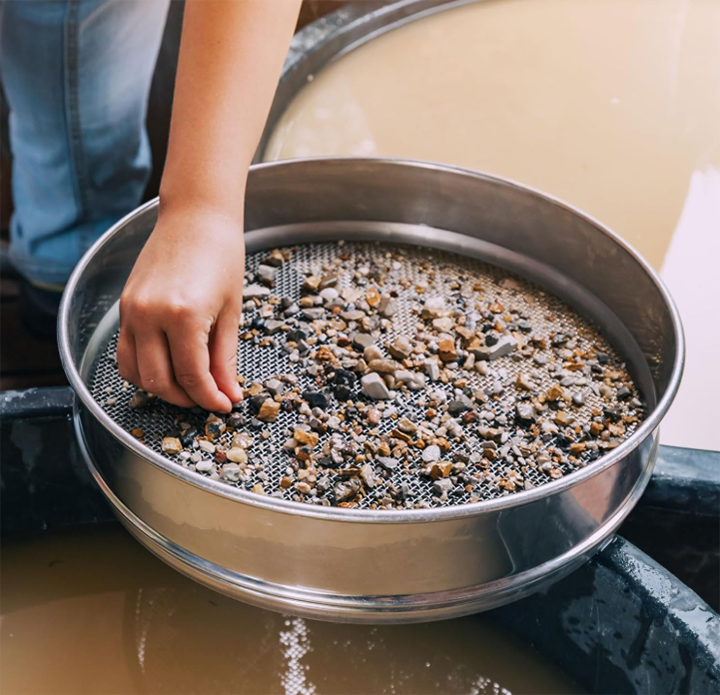
Sieving with the material test sieve with sample requires pretreatment, sieve set preparation, and sieving. The sieved sample is then weighed and analyzed to complete the analysis.
Sample pretreatment: The sample to be analyzed is crushed and ground to an appropriate particle size. After removing impurities, it is then divided using a quartering method or a sample divider to ensure representativeness. The sample size after division should generally meet the screening requirements.
Sieve set selection: Based on the estimated particle size range, stack standard test sieves in descending order of mesh size, attaching a material tray at the bottom and a sieve cover at the top.
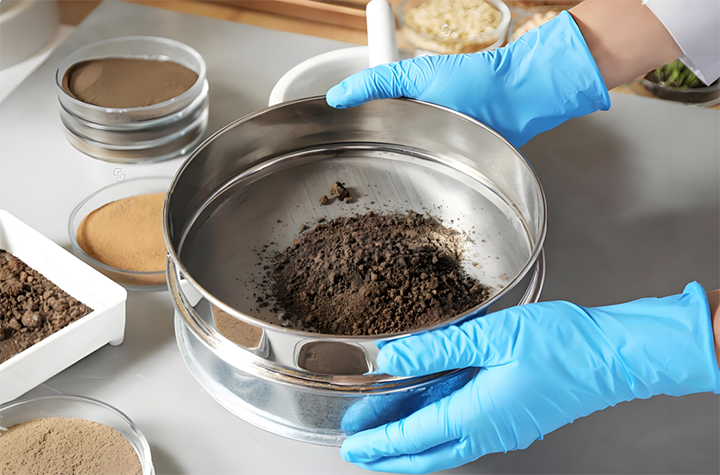
Sieving: Pour the reduced sample evenly onto the top sieve, securely cover the sieve lid, and sieve using either a manual or mechanical sieve shaker. Mechanical sieve shakers require a suitable time setting, typically 5-15 minutes. Manual sieve shakers should ensure uniform vibration in all directions until the amount of material below the sieve remains essentially constant.
Weighing and Calculation: After sieving, remove each sieve layer and receiving tray in turn. Use an electronic balance to weigh the material above the sieve layer. Calculate the percentage of each particle size fraction in the total sample mass and analyze the particle composition characteristics of the material.
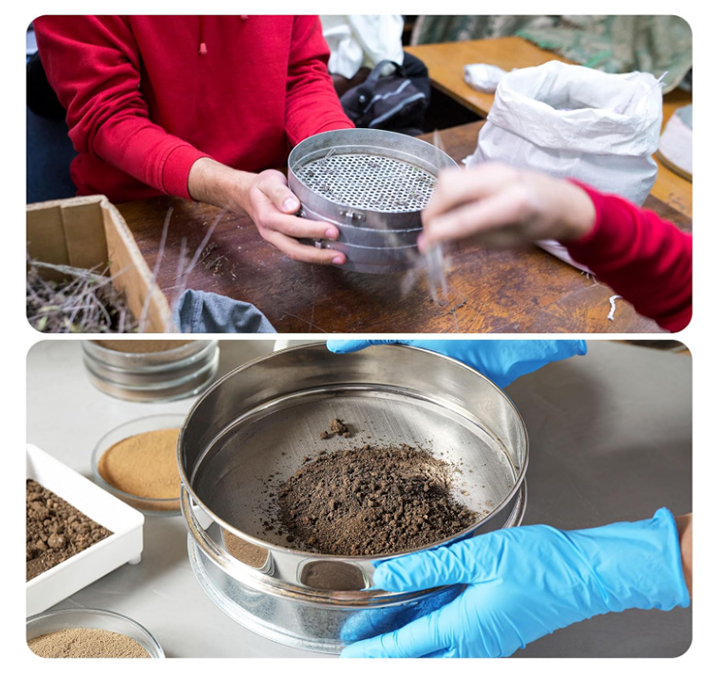
|
Net |
Aperture (mm) |
Net |
Aperture (mm) |
Net |
Aperture (mm) |
|
2 mesh |
12.5 |
45 mesh |
0.4 |
220 mesh |
0.065 |
|
3 Mesh |
8 |
50mesh |
0.355 |
240mesh |
0.063 |
|
4 mesh |
6 |
55 mesh |
0.315 |
250 mesh |
0.061 |
|
5 mesh |
6 |
60 mesh |
0.28 |
280 mesh |
0.055 |
|
6 mesh |
4 |
65 mesh |
0.25 |
300 mesh |
0.050 |
|
8 mesh |
3 |
70 mesh |
0.224 |
320 mesh |
0.045 |
|
10 mesh |
2 |
75 mesh |
0.2 |
325 mesh |
0.043 |
|
12 mesh |
1.6 |
80 mesh |
0.18 |
340 mesh |
0.041 |
|
14 mesh |
1.43 |
90 mesh |
0.16 |
360 Head |
0.040 |
|
16 mesh |
1.25 |
100 mesh |
0.154 |
400 mesh |
0.0385 |
|
18 mesh |
1 |
110 mesh |
0.15 |
500 mesh |
0.0308 |
|
20 mesh |
0.9 |
120 mesh |
0.125 |
600 mesh |
0.026 |
|
24 mesh |
0.8 |
130 mesh |
0.112 |
800 mesh |
0.022 |
|
26 mesh |
0.71 |
140 mesh |
0.105 |
900 mesh |
0.020 |
|
28 mesh |
0.68 |
150 mesh |
0.100 |
10 00 mesh |
0.015 |
|
30 mesh |
0.6 |
160 mesh |
0.096 |
1800 mesh |
0.010 |
|
32 mesh |
0.58 |
180 mesh |
0.09 |
2000 mesh |
0.008 |
|
35 mesh |
0.50 |
190 mesh |
0.08 |
2300 mesh |
0.005 |
|
40 mesh |
0.45 |
200 mesh |
0.074 |
2800 mesh |
0.003 |
material test sieve with sample are typically performed using standard test sieves. These equipment are manufactured to comply with US standard test sieve standards and are available with 1-8 sieve layers. Screening mesh sizes range from 3 mesh to 600 mesh, allowing for coarse or fine screening of materials of varying particle sizes, depending on the intended screening purpose. Standard test sieves utilize motorized vibration for faster screening, resulting in faster test results than conventional manual sieving.
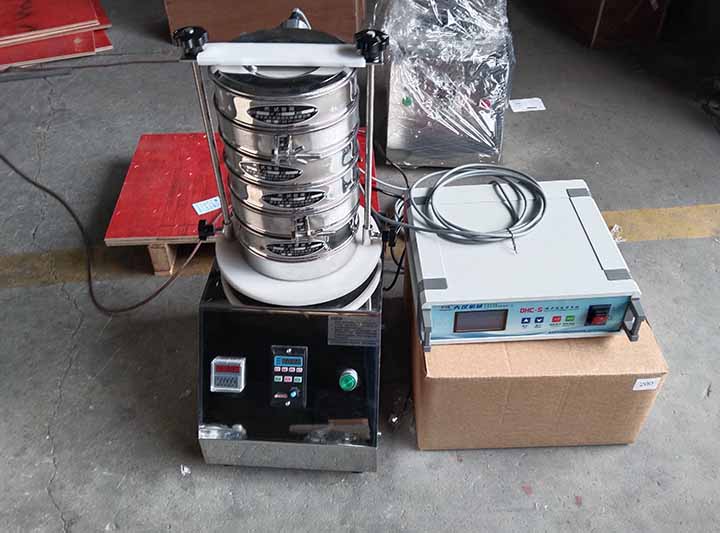
The material used for material test sieve with sample must balance wear resistance, corrosion resistance, and screening accuracy. Common types are as follows:
Metal materials: 304/316L are acid- and alkali-resistant, rust-resistant, and suitable for industries such as food, pharmaceuticals, and chemicals. They can handle corrosive samples and offer stable screening mesh accuracy, such as 0.02mm-5mm. Carbon steel is low-cost and high-hardness, making it suitable for non-corrosive samples such as ores and building materials. However, the equipment is prone to rust and requires regular maintenance.
Non-metallic materials: Nylon is lightweight and impact-resistant, with mesh that resists deformation. It is suitable for screening samples that are susceptible to metal contamination, such as plastic pellets and grain. It is also resistant to weak acids and weak bases. Polyester can withstand temperatures of approximately 120°C and has excellent chemical stability. It is often used for screening electronic materials and fine chemical samples. Silk or spun silk is a traditional material with an extremely fine mesh that can screen samples down to 0.02mm or less. It is suitable for high-precision screening, such as powder metallurgy and cosmetics raw materials, but it is weaker and more susceptible to breakage.
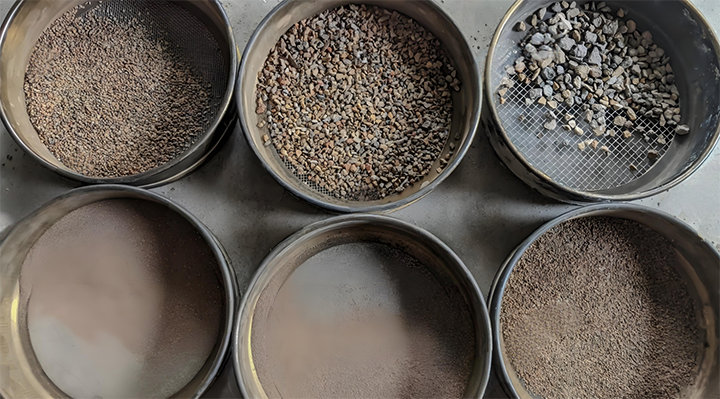
The material test sieve with sample analyzes key metrics such as sample uniformity and impurity content through sieving results, providing direct data support for material quality control, formulation optimization, and process improvement. The device boasts a compact structure, uniform vibration, and high sieving efficiency, making it suitable for a variety of samples, including metal powders, sand and gravel, chemical raw materials, and pharmaceutical powders. Its high repeatability and adjustable sieving time ensure stable and consistent test results, making it an indispensable instrument for laboratory and production testing.
ASTM standard soil analysis sieves with pan and cover
ASTM standard soil analysis sieve is a special test sieve manufactured according to the American Society for Testing and Materials (ASTM) E11 standard...
0.5mm stainless steel soil sieve for lab testing
0.5mm stainless steel soil sieve for lab testing is a screening tool commonly used in soil particle analysis...
Construction soil sieves are used to size-classify bulk granular materials...
Environmental soil sieves are a key tool whose core function is to physically separate soil samples based on particle size...
Oct 10, 2025
material test sieve with sample
Material test sieve with sample By testing samples such as quartz, fertilizers, seeds, etc., the part...
Sep 20, 2025
Standard Test Method for Particle-Size Analysis of Soils
Standard Test Method for Particle-Size Analysis of Soils is used to determine the weight proportions ...
Sep 19, 2025
Stainless steel soil sieve is called soil sieving instrument or soil analysis sieve, and the mesh siz...
Sep 18, 2025
Mud 250 Micron Test Sieve is a standard tool for measuring the particle size of solid particles in dr...
![]()
Then we look forward to hearing from you
Contact Us
Industrials
Yanjin county forest park gate to the west 1000 meters north road sitemap
